
by Maryanne W. Waweru | Oct 29, 2015 | 2015, Advice, Africa, Culture, Kenya, Traditions, World Motherhood
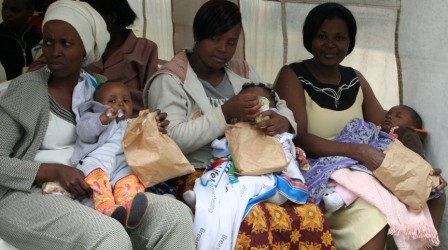
Last Sunday, my closest friend became a mother for the first time. It has been excitement galore from all the people who know her: her family, her friends, her colleagues, neighbors, acquaintances, and just about everybody.
When I visited her in hospital, I found myself giving her all kinds of advice about motherhood from breastfeeding, to weaning, to walking, to teething, all that and more.
Then I quickly told her that I would add her to some Facebook groups that would be of great help to her as a new mum. I began by adding her to a group that is exclusive to Kenyan mums who are breastfeeding. As I did so, I amused myself at how Kenyan mums have turned Facebook into their go-to resource center.
There are plenty of Facebook groups by and for Kenyan mums whose membership constitutes a certain phase of the motherhood journey.
For example, when one is trying to conceive, there is a group to join. When she conceives, she then swiftly moves on to a group for pregnant mums. Once she has her baby, she moves on to the next group –that of breastfeeding mums. After that its a group dedicated to weaning, and where nutrition advice is offered –by fellow mums.
Then there are also larger groups made up of Kenyan mums with babies of whatever age, a general group where everything about motherhood is discussed. From schools, to detergents, to diapers, to cooking fat, tissue paper, to the very critical issue of house girls (nannies). Everything goes. Each of these groups have thousands of members, with one even having slightly over 90,000 members!
I have been in all of these groups, and I am still members in some of them.
In the traditional African setting of the past, new mums were guided into the motherhood journey by the older women around them: their mothers, their aunts, their grandmothers, older cousins and female neighbors.
However, in today’s society some of these traditional fabrics are slowly ebbing away.
More women have to work to supplement the family income, which leaves little option for staying at home to look after the children. In fact, we are seeing less and less of the special interactions between generations of women when it comes to raising her child.
Consequently, we are turning to our friends, our online friends, most of them strangers, for advice that would otherwise have been given to us by our ‘African mothers.’ Combine that with modern technology where access to the internet in many African urban cities is growing, and accessing information and connecting with mums online becomes inevitable.
Sometimes when I think about it, I believe it’s unfortunate, especially for those of us who live in the urban towns, that we no longer have easy access to those traditional pieces of motherhood advice that we would have received directly from our mothers. But, in turn, we are grateful about how the internet has made our parenting journeys significantly easier for our modern lifestyles. Because, it truly has. But, it is only natural to wonder if we may be missing out on something lost.
How has online motherhood support played into your experience as a mother?
This is an original post to World Moms Blog by contributor Maryanne W. Waweru of Kenya.
Photo credit of Kenyan women to the author.
Quote image credit to World Moms Blog.
Maryanne W. Waweru, a mother of two boys, writes for a living. She lives in Nairobi, Kenya with her family. Maryanne, a Christian who is passionate about telling stories, hopes blogging will be a good way for her to engage in her foremost passion as she spreads the message of hope and faith through her own experiences and those of other women, children, mums and dads. She can be found at Mummy Tales.
More Posts - Website

by Karyn Wills | Oct 28, 2015 | 2015, New Zealand, World Moms Blog, World Motherhood
Last week, my six year-old threw a very loud, very intense and very public tantrum. He threw it because I said, No, to a treat that I wasn’t prepared to buy for him. And yes, I did explain why I said, No.

My saying, No, is not a new experience for him. He is familiar with the word and knows what it means. He is intelligent and articulate and understood my reasons for saying, No. I wasn’t too bothered by his outburst. I knew he would get through it and we would be on good terms again by the time we reached home. What was fascinating, to me, was other people’s reactions.
I really, really wish more people understood than these willful tantrums, what I’ve always called Processing Tantrums operate the same as the mourning process. It’s a process to be supported through, not stopped in some way to make me or others feel better.
My son, while in public, was initially in the Denial and then Anger and Bargaining stages. Like the mourning process, he oscillated between them but, because I held the, No, position but was emotionally as supportive as he would allow – mostly through calm words as he wouldn’t let me touch him – by the time we were five minutes away from the store, he hit the Sad stage and a minute later was in Acceptance.
But of course, the people in the store never saw those bits. They just saw the screaming and defiant child and drew their own conclusions. Most kept their opinions to themselves. Some were verbally supportive toward me or used body-language to show they understood. One woman meant very well but managed to irritate me more than the six year-old tantrum.
She told me not to be embarrassed. And seemed quite shocked when I said I wasn’t in the slightest bit embarrassed. Not one ounce of embarrassment was felt by me.
My children are not me. I am not my children and I am certainly not my children’s behaviors. My children are well nurtured, well fed, get loads of sleep, explore and take risks often, have great rituals and firm boundaries. I do my job of parenting them to the best of my ability and they’re turning out just fine.
Their job is to use me as their home base. Their job is to seek comfort from me when they choose to do so. Their job is to move away from me as they desire, at their own pace, in varying amounts as they are so driven. Their job is to learn that things don’t always go their way but they can survive that process and be, not only okay but also have a better understanding of their world and how to reasonably accommodate others, when it’s all over. Their job is to complete the mourning process when they hear that word, No.
I hate to think what would happen if my boys did not learn to properly process, now as children, with my support and understanding. Would they end up being abusive partners because they couldn’t respect the personal boundaries of others? Would they think they were above the law? Would they end up depressed because they got low grades, for what is a low grade but A. Would they stop taking chances and blame everything and everyone else in the world for their inadequacies? I suspect they would. I know plenty of adults who have these characteristics in their personalities.
So, if you see my boys throwing tantrums be assured I am comfortable with the short-term stress of supporting them through those times. They are processing.
I believe it’s worth the short-term pain for the long-term gain of raising kids with character. Their anti-social moments are not their permanent states.
And, really, truly, any tantrums they throw do not embarrass me. I am not my children’s behavior. I am their mother and their lighthouse.
Have you ever had a child tantrum in public? How was that for you? How did other people react?
This is an original post to World Moms Blog by Karyn Wills of Napier, New Zealand.
Photo Credit to Mindaugas Danys
Karyn is a teacher, writer and solo mother to three sons. She lives in the sunny wine region of Hawke’s Bay, New Zealand in the city of Napier.
More Posts

by World Moms Blog | Oct 27, 2015 | 2015, Refugees, Social Good, World Moms Blog, World Voice
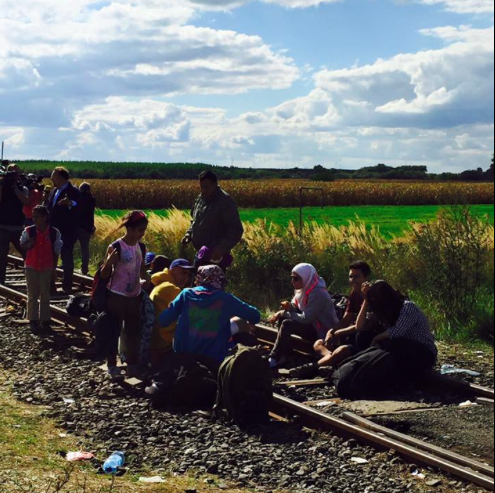
Photo Credit: Jennifer Lovallo
In a time where one’s ethnicity is being questioned or disregarded, as evidenced by the treatment of Syrian refugees, I thought it timely as one of the topics at the recent Social Good Summit.
I’ve attended the Social Good Summit three times, and each time, I came away wanting to be involved more than I ever had before. The topics ranged from human rights to AIDS activism and most importantly this year, the 17 Sustainable Development Goals that are being discussed and implemented by 2030. One of the speakers, United Nations High Commissioner for Refugees, António Guterres, spoke about the importance of being involved at a time of intolerance. The topic was titled “Refugees: The Route to Resettlement” and the panelists outlined what must be done to resolve this issue.
For UNHCR Guterres, it wasn’t just Syrian refugees that need to be addressed as he states, “let’s not forget that 86% of refugees are in the developing world”. It’s become almost “normal” to hear about refugees from Syria looking to resettle, but that’s where the problem lies. Developed countries like the US and Europe should be taking in more refugees, but whether it’s a matter of logistics or fear of being replaced, it has affected the plight of Syrians. Currently, there are more than 4 million Syrian refugees displaced globally and while U.S. Secretary of State John Kerry announced this September that the United States would accept 200,000 refugees, that is a fraction of those who are currently displaced. For Guterres, it’s not enough that we open our doors wide; he believes that the international community must do more and time is of the essence if these issues are to be resolved. These “refugees” should not be shunned but embraced because “diversity is a richness, not a problem”.
Another panelist who made an impassioned plea to find some solutions for this issue was UNCHR Ambassador of Goodwill Ger Duany. Duany was a former child soldier, one of the Lost Boys of Sudan, until he fled to the United States in 1994. For Duany, being a former refugee makes him a great barometer for what could be the future of refugees. When he became a political prisoner, he turned his life around and has become an example of what one can accomplish given the chance.
What is becoming dangerous at this time and affects the future of anyone looking for asylum are the economic ramifications that result from helping them resettle. In addition to economic instability, there is a pattern of xenophobia that is being experienced in Lebanon, Jordan and currently, Europe. Xenophobia is an unfortunate byproduct of the unknown, but it should not shape or affect how we treat others, especially those who are in danger.
It is necessary that as a society, we remember that so many of us came from places where we were forced to leave our homes, families and lives. It is vital to remember that without “refugees” our society would not have the richness of cultures that we have today.
It is disconcerting that a “refugee” , whose primary goal is to find a safe haven for themselves and their families, has evoked negative responses from those who feel threatened by their presence.
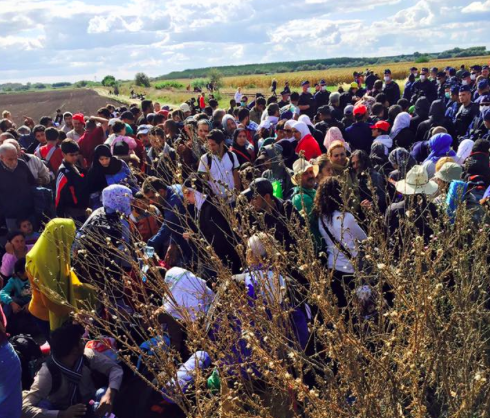
Photo Credit: Jennifer Lovallo
As someone whose parents came to this country to escape martial law in the Philippines, it is heartbreaking to see photos and read of the plight of these refugees, seeking asylum and freedom from their suffering. As a wife and mother of a teen, I can only imagine how I would be if I were ever in the same situation. My family was lucky to have escaped from a dictatorship, but I also know that it could have gone quite differently.
While the Social Good Summit has come and gone, there is more work to do if we are to solve the refugee crisis at hand. The SDG’s and conversations are great starting points, but concrete actions are needed to ensure that refugees are not ignored or forgotten. It is my hope that the implementation of the proposed Sustainable Development Goals will propel actions to resolve this crisis.
Does your own family have a history that includes a refugee tale?
 This is an original post written for World Moms Blog by guest contributor Tes Silverman of www.pinayperspective.com
This is an original post written for World Moms Blog by guest contributor Tes Silverman of www.pinayperspective.com
Tes Silverman was born in the Manila, Philippines and has been a New Yorker for more than 30 years. Moving from the Philippines to New York opened the doors to the possibility of a life of writing and travel. Before starting a family, she traveled to Iceland, Portugal, Brussels, and France, all the while writing about the people she met through her adventures. After starting a family, she became a freelance writer for publications such as Newsday’s Parents & Children and various local newspapers. Four years ago, she created her blog, The Pinay Perspective. PinayPerspective.com is designed to provide women of all ages and nationalities the space to discuss the similarities and differences on how we view life and the world around us. As a result of her blog, she has written for BlogHer.com and been invited to attend and blog about the Social Good Summit and Mom+Social Good. Currently residing in Huntington, NY with her husband, sixteen year-old daughter and nine year-old Morkie, she continues to write stories of women and children who make an impact in their communities and provide them a place to vocalize their passions.
World Moms Blog is an award winning website which writes from over 30 countries on the topics of motherhood, culture, human rights and social good. Over 70 international contributors share their stories from around the globe, bonded by the common thread of motherhood and wanting a better world for their children.
World Moms Blog was listed by Forbes Woman as one of the "Best 100 Websites for Women 2012 & 2013" and also called a "must read" by the NY Times Motherlode in 2013. Our Senior Editor in India, Purnima Ramakrishnan, was awarded the BlogHer International Activist Award in 2013.
More Posts

by Jennifer Burden | Oct 23, 2015 | 2015, North America, Uncategorized, USA
“I know nothing about politics.”
“I just don’t have time to vote.”
“The person who I wanted to run didn’t make my party’s ticket, so I’m not voting.”
“They’re so-and-so’s friend, so I’ll vote for them.”
“My one vote won’t make a difference!”
These are quotes that I’ve heard too many times by intelligent women. Are you surprised to hear them, or perhaps you have heard them, too? Maybe, like me, you have even said one in the past. I understand.
Politics gave me a headache when I turned 18 and was first eligible to vote. I asked friends for advice on who they were voting for. I often felt like it seemed to be something that other people just knew more about. I had stances on issues, but wasn’t sure which candidates would vote for what I supported. I really didn’t know what to ask the candidates or how to engage. I felt insecure about the whole thing. That was way back then.
I had to look at it like this — if I was giving a job interview for a position, would I ever hire someone because someone told me to, or because they were nice or because they were my neighbor’s cousin? Or maybe because they had more signs around town? No, way! As a voter, my job is to help fill government positions.
It didn’t take long until I realized that politics wasn’t something I should be running from, but rather, running toward. Over the years I have gone to Capital Hill to lobby Congress; picked up the phone to call the offices of my Governor, Senators and Representatives; sent e-mails; and tweeted to let them know what issues I wanted them to vote on. Have I ever voted outside my party? Yes. Remember, it’s all about the job interview and who the best candidate is to support the issues that you care about most.
With election day around the corner in the U.S., I’ve started a list of general questions that can be tailored based on the issues that you support.
1) Why do you want this job?
Every candidate should have a quick “elevator speech” about why they are running. Hear them out.
2) Who is funding your campaign?
Knowing what organization or people a candidate is accepting campaign funds from is important. Look out for candidates who may choose to act based on their top donors’ best interests. And see if those interests are aligned with what you value.
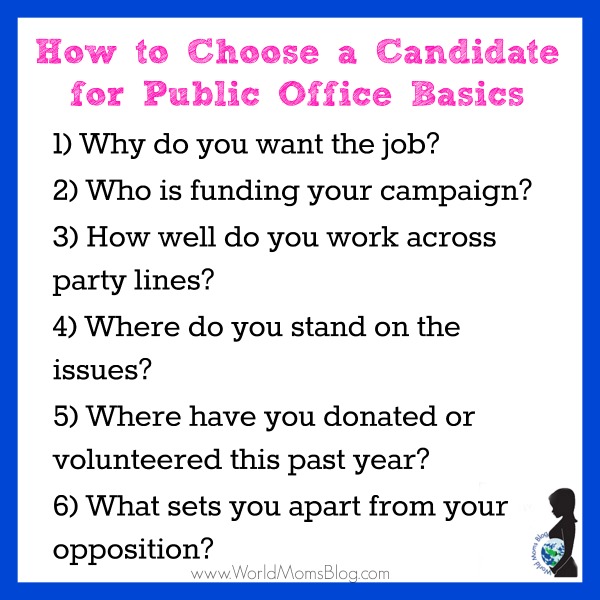
3) How well do you work across party lines?
Asking a candidate to explain a time in which they helped achieve success when working across party lines will tell you a little about how comfortable they seem working with people who think differently from them. It’s important that they work to get things done for the best interest of the people, not just in the best interest of their party.
4) Where do you stand on the issues?
This is homework you, yes YOU, have to do. Figure out the top 5 issues most important to you. What do you want to see changed, supported or kept in place? Next, ask or find out where the candidates stand on those issues. Here are some of mine:
How do you stand on the national/local environment? Can you provide examples of when you sought change to keep our environment clean or protected?
How do you stand on issues concerning women and girls?
Can you provide some examples of when and how you championed equality efforts?
What plans do you have to help disadvantaged children?
What is your track record on supporting global health programs?
5) What charitable organizations have you volunteered for or donated to this calendar year?
I’d like to know this about a candidate. It helps me get to know where their interests and passions lie.
6) What sets you apart from the other candidates for this position?
This is an important question. Your candidate knows what makes them different, so hear them out. Ask for working examples of how they stand apart. But remember, when they tell you that their opposition stands or doesn’t stand for x, y and z, follow up, and fact check.
Help me add to the list! What would you ask?
And, tell us the issues that you value most when voting!
This is an original post to World Moms Blog by Founder and CEO, Jennifer Burden.
Related post: Have you read Mama B’s post about the first time women in Saudi Arabia will be voting in December 2015?

Jennifer Burden is the Founder and CEO of World Moms Network, an award winning website on global motherhood, culture, human rights and social good. World Moms Network writes from over 30 countries, has over 70 contributors and was listed by Forbes as one of the “Best 100 Websites for Women”, named a “must read” by The New York Times, and was recommended by The Times of India.
She was also invited to Uganda to view UNICEF’s family health programs with Shot@Life and was previously named a “Global Influencer Fellow” and “Social Media Fellow” by the UN Foundation. Jennifer was invited to the White House twice, including as a nominated "Changemaker" for the State of the World Women Summit. She also participated in the One Campaign’s first AYA Summit on the topic of women and girl empowerment and organized and spoke on an international panel at the World Bank in Washington, DC on the importance of a universal education for all girls. Her writing has been featured by Baby Center, Huffington Post, ONE.org, the UN Foundation’s Shot@Life, and The Gates Foundation’s “Impatient Optimists.” She is currently a candidate in Columbia University's School of International and Public Affairs in the Executive Masters of Public Affairs program, where she hopes to further her study of global policies affecting women and girls.
Jennifer can be found on Twitter @JenniferBurden.
More Posts - Website
Follow Me:


by Carol (Canada) | Oct 22, 2015 | 2015, Babies, Being Thankful, Canada, Communication, Culture, Family, Feminism, Husband, Kids, Life Balance, Marriage, Me-Time, Mental Health, Motherhood, Parenting, Responsibility, World Motherhood, Younger Children
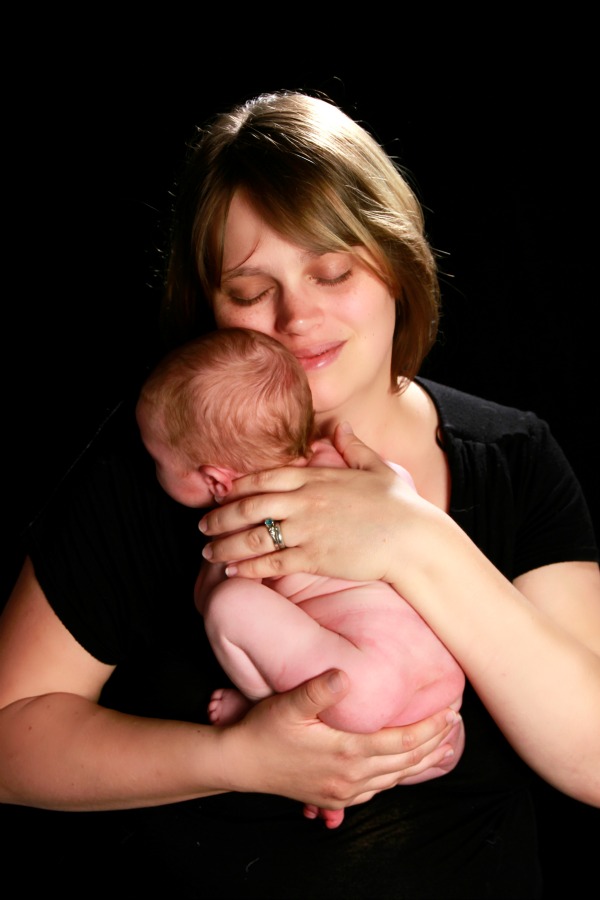
My husband doesn’t like babies. That’s a problem, because in Canada, men are expected to share parenting duties. Women expect help from their husband when a baby is born, and I wasn’t any different. (more…)
Carol from If By Yes has lived in four different Canadian provinces as well as the Caribbean. Now she lives in Vancouver, working a full time job at a vet clinic, training dogs on the side, and raising her son and daughter to be good citizens of the world.
Carol is known for wearing inside-out underwear, microwaving yoghurt, killing house plants, over-thinking the mundane, and pointing out grammatical errors in "Twilight". When not trying to wrestle her son down for a nap, Carol loves to read and write.
Carol can also be found on her blog, If By Yes, and on Twitter @IfByYesTweets
More Posts - Website
Follow Me:


by Ruth | Oct 21, 2015 | 2015, Inspirational, Ruth Wong, Womanhood, World Moms Blog, World Motherhood

Dear fellow mom,
Thank you for being who you are.
Thank you for your love, devotion and sacrifices, even when there’s no words of appreciation.
Thank you for your strength, gentleness and faith in the little ones entrusted to you by God.
Thank you for hanging on no matter how tough the situation might be, because you love and care enough.
Thank you for what you do for your kids and family – especially the mundane, it does call for dedication.
I acknowledge you for all that you’ve done. Know that what you do matters, even when you don’t feel that way. Take heart, the ‘small’ tasks do add up.
Thank you for being the mom that you are, with all your warts and imperfections. Even during moments when you feel like you’re a lousy, imperfect mom, remember, in the eyes of your little ones, you are the best mom ever.
After all, who you are is not dependent on what you do, what you have or what your credentials are.
So be patient with yourself, forgive yourself for your mistakes, and love yourself more.
Let go of your expectations; focus on being, rather than on doing.
The truth is, you are right now the best mom that you can be. Yes, there’s always room for improvements. But that’s not the point.
The point is you are doing your best, and that’s what matters. So stop being so hard on yourself and start showing yourself a little more compassion.
Remember, motherhood is a journey. Enjoy the process, grow through the challenges, and create beautiful moments that become cherished memories long after you are gone.
And I write this not because I’m a perfect mom. I am as imperfect as you are, often feeling guilty that I’m not good enough or have not done more. But often in one of these moments, my son would come and wrap his arms around me (as if he’s read my mind) and tell me how much he loves me and that I’m the best mom in the whole world.
So dear fellow mom, relax and breathe a little deeper. Smile at your imperfections, knowing that none of us is “there yet”. Take time to celebrate you today, because you do deserve it.
This is an original post for World Moms Blog from our blogger and mother of one, Ruth Wong in Singapore.
The image used in this post is credited to the author.

Ruth lives in Singapore, a tiny island 137 kilometres north of the equator. After graduating from university, she worked as a medical social worker for a few years before making a switch to HR and worked in various industries such as retail, banking and manufacturing. In spite of the invaluable skills and experiences she had gained during those years, she never felt truly happy or satisfied. It was only when she embarked on a journey to rediscover her strengths and passion that this part of her life was transformed. Today, Ruth is living her dreams as a writer. Ironically, she loves what she does so much that at one point, she even thought that becoming a mom would hinder her career. Thanks to her husband’s gentle persuasions, she now realises what joy she would have missed out had she not changed her mind. She is now a happy WAHM. Ruth launched MomME Circle, a resource site to support and inspire moms to create a life and business they love. She has a personal blog Mommy Café where she writes about her son's growing up and shares her interests such as food and photography.
More Posts








 This is an original post written for World Moms Blog by guest contributor Tes Silverman of
This is an original post written for World Moms Blog by guest contributor Tes Silverman of 









